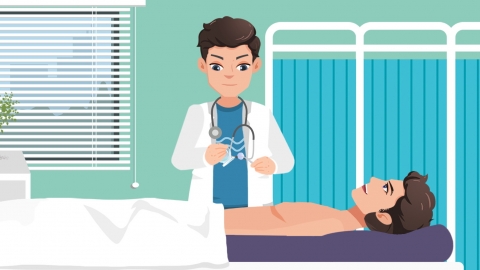What causes low estradiol and testosterone levels?
Low levels of estradiol and testosterone may be caused by aging, chronic stress, malnutrition, premature ovarian insufficiency, orchitis, and other factors. Management can vary depending on the specific situation. If physical discomfort occurs, it is recommended to seek medical attention at a hospital promptly and follow medical advice for appropriate treatment.

1. Aging: As age increases, the body's endocrine function naturally declines, leading to reduced function of the ovaries or testes, which results in decreased secretion of estradiol and testosterone. In daily life, one can appropriately increase intake of foods rich in protein and vitamins, ensure adequate sleep, and engage in moderate exercise to maintain bodily functions.
2. Chronic Stress: Prolonged mental tension or excessive stress may inhibit the ovaries or testes from secreting estradiol and testosterone. Women may experience menstrual irregularities and significant mood fluctuations, while men may develop sexual dysfunction and anxiety. It is recommended to relieve stress through activities such as listening to music, meditation, or traveling, maintain a cheerful mood, establish a regular sleep schedule, and avoid staying up late.
3. Malnutrition: Some individuals may experience inadequate intake or poor absorption of nutrients due to long-term dieting, picky eating, or digestive system disorders, leading to deficiencies in essential nutrients required for hormone synthesis, thereby lowering estradiol and testosterone levels. It is recommended to adjust dietary structure to ensure balanced nutrition and increase consumption of foods such as meat, legumes, and nuts.
4. Premature Ovarian Insufficiency: Factors such as genetic predisposition, autoimmune diseases, or surgery may lead to premature ovarian failure, preventing normal secretion of estradiol and testosterone, resulting in infrequent menstruation or even amenorrhea, accompanied by symptoms such as hot flashes, insomnia, and vaginal dryness. Patients may use medications like estradiol valerate tablets, progesterone capsules, and Kuntai capsules under medical guidance to alleviate symptoms.
5. Orchitis: Bacterial or viral infections may cause orchitis, where inflammation damages testicular tissue, potentially affecting testosterone secretion, leading to reduced testosterone levels, testicular pain and swelling, diminished sexual function, and decreased sperm quality. It is recommended to use medications such as cefixime capsules, levofloxacin tablets, and ibuprofen sustained-release capsules under medical supervision to promote recovery.
In daily life, it is advisable to improve lifestyle habits, ensure adequate rest and sleep, maintain a balanced diet, and engage in moderate exercise to support overall health.
References:
[1] Wang Xiu-ping, Qiao Xian-wei, Xu Bing. Clinical Observation of Kuntai Capsules Combined with Estradiol Tablets/Estradiol Dydrogesterone Tablets in the Treatment of Diminished Ovarian Reserve Function [J]. China Pharmacy, 2025, 36(05): 589-593.
[2] Zhuo Tao, Yang Húdié, An Hengqing, et al. Association Between Initial Serum Testosterone Levels and Prognostic Indicators in Patients with Metastatic Prostate Cancer [J]. Modern Journal of Urology, 2024, 29(06): 514-520.




